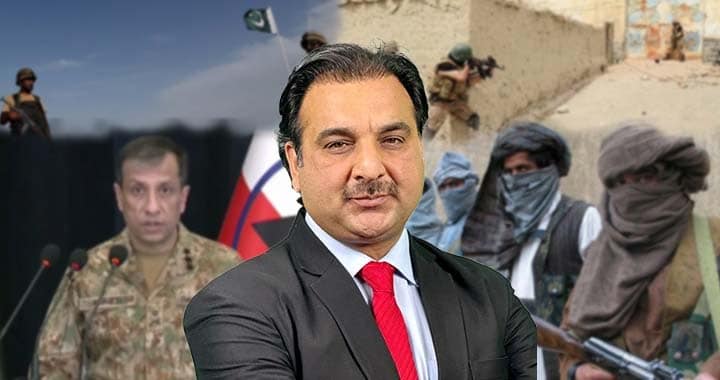Irfan Khan
In 2025, Pakistan once again finds itself grappling with a resurgence of terrorism a grim reminder that the country’s long and costly struggle against militancy remains far from over. According to the Director General Inter-Services Public Relations (DG ISPR), there has been a sharp increase in terrorist incidents across the country this year, with Khyber Pakhtunkhwa (KP) emerging as the worst-hit province. Both security forces and civilians have been targeted simultaneously, underscoring the depth of the challenge.
The DG ISPR’s recent remarks lay bare the uncomfortable truths behind Pakistan’s renewed wave of militancy. The reasons are complex political interference, weak governance, judicial stagnation, and an unimplemented National Action Plan (NAP) but the outcome is tragically simple: a mounting death toll and a growing sense of national insecurity.
The National Action Plan, once heralded as Pakistan’s blueprint to eradicate terrorism, has largely been reduced to a symbolic document. Originally formulated in 2015 following the horrific Army Public School (APS) attack in Peshawar, the NAP represented a rare moment of national unity. Then-Prime Minister Nawaz Sharif, the military leadership, and all political parties including the PTI gathered in Peshawar to pledge a collective response to extremism.
The plan initially outlined 21 points, ranging from strengthening the National Counter Terrorism Authority (NACTA) and reforming the judiciary to curbing hate speech and regulating seminaries. However, by 2021, little progress had been made. The revised version, titled “Azm-e-Istiqam,” condensed these 21 points into 14 actionable priorities but implementation remained elusive.
The first of these points, “No Militancy,” demanded a robust response by the police, Counter-Terrorism Department, and intelligence agencies. Yet, despite over 10,000 intelligence-based operations in KP from January to September 2025 in which 917 militants were killed the province still accounts for 70 percent of all terrorist attacks in Pakistan this year.
This stark contradiction reveals a disturbing truth: security operations alone cannot compensate for the failure of governance and justice.
One of the most glaring failures lies within Pakistan’s judicial system. In August 2025, the conviction rate for 34 major terrorist attacks in KP was recorded at zero. In the past five years, more than 4,600 terrorism-related cases have been registered, but convictions remain negligible.
This paralysis reflects a deeper governance failure. Implementation of the 13 remaining NAP points has stalled, with political administrations and bureaucratic machinery unwilling or unable to act. The DG ISPR’s data shows more than 10,000 FIRs filed and over 10,200 arrests, yet the conviction-to-arrest ratio is alarmingly low.
When the army highlights these gaps, it is often accused of overstepping into civilian domains. Yet, as Irfan Khan notes, the DG ISPR’s briefing “read like a charge sheet against political leadership and administrative inefficiency.” The military insists it cannot take over governance or judicial reforms responsibilities that rest squarely with civilian authorities.
The rot, however, runs deeper than mere inefficiency. Pakistan’s war on terror has long been compromised by what experts describe as a criminal-political-terror nexus. Politicians, criminals, and militant networks often maintain covert ties, mutually benefiting from each other’s influence and protection.
In many areas, local actors fearing for their survival collaborate with extremist outfits, offering them safe passage or intelligence. Such complicity erodes the state’s moral authority and fuels a culture of impunity. Until this nexus is dismantled, the war on terror will remain unwinnable from within.
Another major contributor to Pakistan’s current predicament is the Doha Agreement of 2020, signed between the United States and the Afghan Taliban. The deal, intended to pave the way for peace, instead sowed new seeds of instability. By sidelining the Afghan government and legitimizing an armed insurgent group, it created a power vacuum that militant organizations were quick to exploit.
Contrary to the agreement’s stipulations, Afghan soil continues to host several international terrorist groups, including the Tehrik-e-Taliban Pakistan (TTP), Islamic State Khorasan Province (ISKP), ETIM, and remnants of Al-Qaeda. These groups now operate with impunity, turning Afghanistan into what the DG ISPR called the “base of Indian proxies”.
Indeed, multiple international reports including those by SIGAR and the United Nations confirm the presence of over 27 terrorist organizations in Afghanistan. This is not merely a threat to Pakistan, but a danger to regional and global security. China, Russia, and Iran have all voiced concerns over the spillover of militancy from Afghan soil.
Perhaps the most alarming insight from the DG ISPR’s address is the extent to which domestic politics has undermined Pakistan’s counterterrorism strategy. The politicization of national security whether through policy paralysis, partisan blame, or ill-conceived reconciliation attempts has deeply compromised the state’s ability to respond effectively.
Between 2020 and 2021, under the PTI government, efforts were made to negotiate with the TTP and resettle militants in Khyber Pakhtunkhwa. Around 6,000 to 8,000 militants were reportedly brought back under the guise of “reconciliation.” This policy — shaped by political expediency rather than strategic foresight has now backfired. The very groups once welcomed for talks have resumed their campaign of terror.
The DG ISPR was clear: negotiations cannot substitute for accountability. When politics shields those who jeopardize security, the cost is borne by the people and soldiers who continue to sacrifice their lives.
The lesson from 2025 is clear: Pakistan’s war on terror cannot be won through operations alone. It requires a whole-of-state approach one that unites governance, justice, and policy under a shared sense of national purpose.
The National Action Plan must be revived, depoliticized, and implemented in letter and spirit. Judicial reforms must ensure convictions follow crimes. Political patronage networks must be dismantled. And above all, the state must speak with one voice against terrorism — not negotiate with it.
Until then, the sacrifices of Pakistan’s soldiers and citizens will remain trapped in a tragic cycle of repetition, and the “unending war” against terror will continue to haunt the nation.





